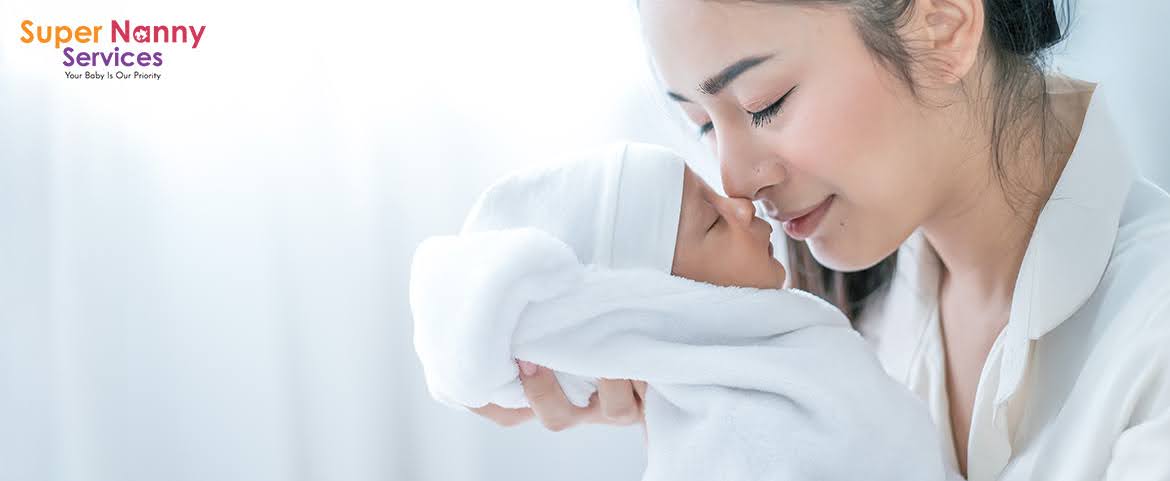Bringing a new life into the world is a beautiful yet challenging experience filled with joy, excitement, and overwhelming moments. During this transformative time, the support a new mother receives can greatly impact her physical and emotional well-being. In many cultures, this support is embodied in postpartum confinement traditions, which guide mothers through recovery, focusing on rest, diet, and specialised care to promote healing and ease the transition into motherhood.
In Singapore, a nation known for its rich multicultural fabric, postpartum confinement practices are diverse, offering families a wide range of care options. Confinement agencies play a crucial role in helping mothers navigate these practices, providing personalised care that aligns with cultural preferences and healing needs.
This guide explores the country’s rich variety of postpartum confinement traditions, from long-held practices to modern approaches. Whether you’re seeking traditional methods or a more contemporary style of postnatal care and personalised postnatal support, this guide will help you choose the best path for a restorative and meaningful recovery for both mother and baby.
Part 2: Postpartum Confinement Practices Across Cultures
The postpartum period is crucial for healing, and many cultures have developed unique practices to support new mothers through this transition. In this section, we’ll explore some of the most cherished postpartum recovery traditions, starting with Chinese practices, which are deeply rooted in history and traditional medicine. These time-honoured rituals have been passed down through generations, offering mothers the care they need to rest, recover, and thrive during this special time.
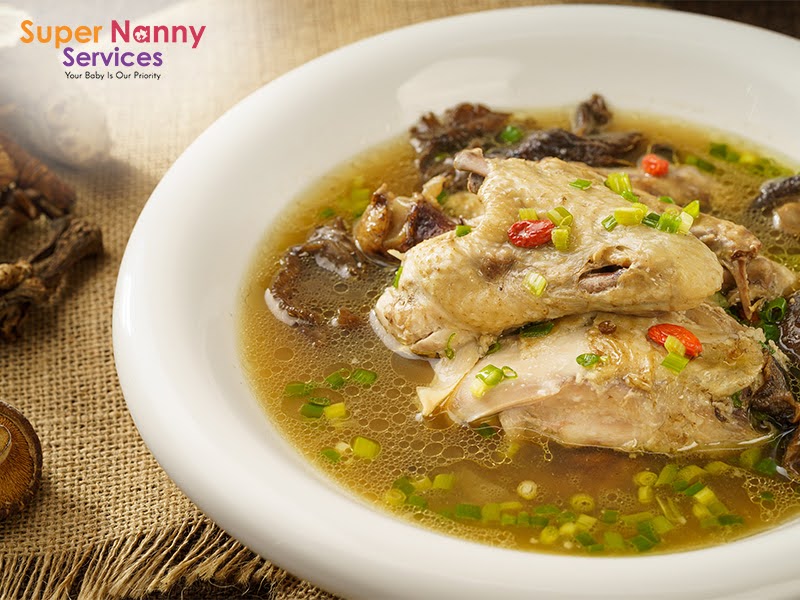
2.1 Traditional Chinese Confinement Practices
In Chinese culture, the postpartum period is traditionally known as “Zuo Yue Zi,” which means “sitting the month.” This practice focuses on restoring balance to a mother’s body, especially the yin-yang equilibrium disrupted by childbirth. Passed down through generations, it emphasises the importance of recovery to prevent long-term health issues. The belief is that not taking proper care after birth can lead to persistent challenges, like fatigue, joint pain, and digestive discomfort.
Key Elements of Chinese Confinement
Chinese postpartum confinement practices are deeply rooted in traditional beliefs and principles of Traditional Chinese Medicine (TCM). These customs focus on helping mothers regain balance after childbirth, promoting healing through diet, rest, and specialised care. The key elements of Chinese confinement include carefully selected foods, specific physical care routines, and cultural rituals designed to support a mother’s healing and well-being during this critical recovery period.
Dietary Practices
Central to Chinese postpartum confinement is a focus on nourishing foods that aid the mother’s recovery. Meals are often warm and nutrient-rich, incorporating ingredients such as ginger, sesame oil, red dates, and herbal soups, all believed to promote healing and boost energy levels. The practice includes avoiding “cooling” foods, like raw vegetables or cold drinks, which are thought to weaken the immune system and slow recovery.
Chinese herbs, such as Dang Gui (Angelica) and Chinese wolfberry, are also commonly used in meals to support blood circulation, enhance lactation, and restore energy (qi). These foods are prepared with great care, following TCM principles, to provide the nourishment needed for both physical and emotional recovery.
Physical Care
Physical recovery is just as important as diet in Chinese postpartum confinement practices. Mothers are encouraged to limit movement to conserve energy, giving their bodies the time they need to fully recover. For the first month, it’s common for mothers to avoid bathing or washing their hair, a practice believed to protect against “wind,” which can cause joint pain later in life. While this might seem difficult, especially in Singapore’s humid climate, staying warm and avoiding cold drafts is considered essential for healing. Mothers often wear thick clothing and blankets, even in warm weather, to maintain body heat and prevent illness.
Confinement Nannies’ Role
In Singapore, a stay in nanny is often an integral part of the postpartum confinement period. These nannies are skilled in preparing meals that follow TCM dietary practices, ensuring the mother gets the proper nutrition and herbal remedies. Beyond meal prep, they assist with newborn care, including feeding, bathing, and swaddling, allowing the mother to rest and recuperate. They also manage the home environment, ensuring the temperature and other conditions are suited to the mother’s needs for recovery.
Emotional support is another vital aspect of a confinement nanny’s role. Understanding the cultural significance of this time, they provide companionship and reassurance, helping mothers navigate both physical recovery and the emotional challenges of new motherhood.
Modern Adaptations
While traditional practices remain highly respected, many confinement agencies in Singapore have adapted these customs to fit modern lifestyles. For example, some agencies offer flexibility around bathing, allowing mothers to bathe with warm, herbal-infused water, balancing both cleanliness and traditional healing methods. Modern confinement care often includes personalised services so mothers can customise their confinement experience, blending traditional practices with contemporary comforts. This allows families to honour cultural customs while enjoying the conveniences of modern life.

2.2 Malay Postpartum Care Practices
In Malay culture, the postpartum period is called “pantang,” a time of great importance where mothers follow specific practices to protect their health and restore their strength. Pantang is rooted in the belief that “wind” and “coldness” in the body weaken the mother and hinder her recovery. These practices focus not only on physical healing but also on emotional well-being, allowing mothers to rest, heal, and regain strength. While variations exist within different Malay communities, the core focus remains the restoration of body and soul after childbirth.
Main Elements of Malay Confinement
Malay postpartum confinement is based on time-honoured practices aimed at supporting physical and emotional recovery. These customs help restore balance to the body, nurturing the new mother with traditional therapies that ensure comfort and healing. Key elements include body care rituals, herbal treatments, and dietary rules passed down through generations to provide a holistic approach to recovery.
Body Care and Massage
A significant aspect of Malay postpartum confinement is the traditional massage, or “urut.” This technique improves blood circulation, reduces muscle soreness, and promotes overall recovery by stimulating the body’s natural energy. Often combined with postpartum abdominal binding, or “bengkung,” it supports the abdomen and aids in reshaping the body after childbirth. The binding is thought to help restore body shape and promote abdominal healing.
The massage uses oils infused with herbal ingredients like turmeric and ginger, which are believed to soothe muscles, improve circulation, and accelerate healing. The physical touch also provides comfort, relaxation, and emotional support to mothers during their recovery.
Herbal Treatments and Confinement Dietary Practices
Herbal remedies play a vital role in Malay postpartum confinement care. Herbal baths and compresses, using ingredients like turmeric, ginger, and pandan leaves, help soothe the body, cleanse the skin, and alleviate discomfort during recovery. Dietary practices focus on “heating” foods like ginger, black pepper, and various herbs to restore warmth and balance. Cold foods and drinks are avoided, as they are believed to slow healing, affect digestion, and interfere with recovery.
Role of Confinement Lady
A Malay confinement nanny, or “confinement lady,” is skilled in the traditional practices of pantang and plays a crucial role in supporting a mother during this period. These nannies are trained to perform urut massages, prepare herbal remedies, assist with dietary needs, and ensure that traditional customs are followed with care. They also provide essential help with baby care, such as feeding, bathing, and soothing the newborn, giving the mother space to focus on her own recovery.
Beyond physical support, the confinement lady offers emotional reassurance, guiding the new mother through the pantang practices and providing companionship during a potentially isolating time. For those seeking support, a confinement lady recommendation can help ensure that the right care is provided during this special healing period.
How Confinement Agencies Can Adapt
Confinement agencies in Singapore offer personalised services that cater to Malay postpartum practices, ensuring mothers receive the care they need while respecting cultural traditions. These agencies provide nannies trained in traditional urut massages and knowledgeable about pantang rituals, supporting the mother’s physical, emotional, and cultural needs.
Agencies also offer flexibility, allowing Malay clients to incorporate specific customs into their confinement plan. Whether it’s preparing herbal remedies, following dietary principles, or simply offering support in line with tradition, confinement agencies help blend cultural practices with modern care, ensuring comfort, healing, and respect for the new mother.
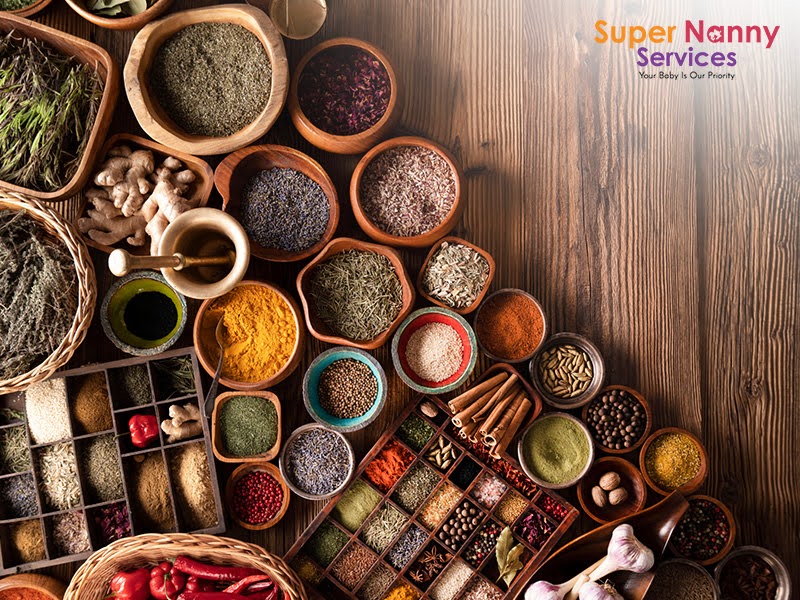
2.3 Indian Postpartum Practices
Indian postpartum traditions are deeply influenced by Ayurvedic principles, which emphasise restoring balance to the body, mind, and spirit after childbirth. While practices vary across regions, they all emphasise “warming” therapies that support the mother’s health and well-being. The aim is to promote long-term physical and emotional recovery, helping new mothers regain strength and care for their newborns.
Core Aspects of Indian Confinement
Indian postpartum confinement care follows Ayurvedic principles, focusing on nurturing the body, mind, and spirit after childbirth. Key practices include warming therapies, specialised diets, and physical treatments to help restore balance and support recovery during the postpartum period.
Ayurvedic Principles
In Ayurveda, childbirth depletes a mother’s natural strength. During recovery, the focus is on replenishing the body with easily digestible, warm foods that support digestion, immunity, and lactation. Common ingredients include ghee, turmeric, fenugreek, and a variety of spices known for their healing properties. Herbal teas with ginger and cardamom are also commonly consumed to maintain warmth and aid recovery, helping the mother regain her vitality.
Massage and Physical Therapy
A central aspect of Indian postpartum confinement care is daily oil massages, known as abhyanga. This involves massaging the body with warm oils, such as sesame or mustard, infused with Ayurvedic herbs. The practice is believed to relieve tension, improve circulation, and support muscle recovery. In some cases, abdominal wraps or binding are used to help restore the body’s shape and strengthen abdominal muscles. These therapies provide both physical and emotional comfort during the transition to motherhood.
Role of Confinement Nannies
An experienced confinement nanny familiar with Indian postpartum confinement practices plays a vital role in supporting the mother’s recovery. Trained in Ayurvedic dietary principles, they prepare nourishing meals that aid healing. They also provide daily massages and other therapeutic treatments to help the mother feel revitalised. Additionally, a confinement nanny takes care of the newborn, allowing the mother to focus on her recovery while ensuring the cultural integrity of Indian postpartum practices is maintained.
Contemporary Adaptations by Confinement Agencies
In Singapore, confinement agencies provide tailored services that blend Ayurvedic principles with Indian postpartum practices, offering mothers the option to incorporate traditional therapies alongside modern conveniences. These agencies provide flexible schedules, allowing families to adjust practices to their comfort and preferences. This cultural sensitivity ensures that new mothers receive postpartum care that aligns with their values, providing the perfect balance of traditional and contemporary support during their recovery. Whether you’re seeking confinement services or personalised postpartum care, these agencies help ensure a smooth and culturally respectful recovery journey.
2.4 Western Postpartum Support Approaches
Unlike traditional postpartum confinement practices, Western postpartum care is typically more flexible and less prescriptive. It focuses on personal preferences and a more relaxed approach to recovery. Instead of rigid dietary rules or physical restrictions, the focus is on emotional, mental, and practical support during the early stages of motherhood. This approach values the mother’s autonomy and encourages a balance between self-care, newborn care, and reintegrating into daily life.
Popular Postpartum Practices
In Western postpartum care, the emphasis is on flexibility and emotional support, with practical assistance designed to help mothers recover at their own pace. This approach prioritises overall well-being while offering freedom from strict traditions. Let’s take a closer look at some of the most common practices embraced in Western postpartum care.
Doula Support and Emotional Care
Doulas play a crucial role in Western postpartum care by offering emotional and practical support to new mothers. Their focus is on boosting the mother’s confidence, comfort, and mental well-being. Doulas provide continuous support during labour and beyond, assisting with newborn care, breastfeeding, and helping mothers adjust to their new role. Unlike traditional confinement nannies, doulas empower mothers to engage in their routines, providing reassurance and coping strategies for the emotional and psychological aspects of postpartum recovery.
Nutrition and Light Exercise
Western postpartum care encourages balanced nutrition to restore energy levels and support healing. A varied diet rich in protein, vitamins, and minerals is recommended for recovery and overall health. Unlike more rigid dietary restrictions, this approach emphasises nourishing the body with a range of foods, including fruits, vegetables, and whole grains. Light exercises such as stretching, walking, and postnatal yoga are also encouraged to help mothers regain physical strength and improve mental well-being, all while avoiding strain. This approach allows mothers to regain their pre-pregnancy shape at their own pace, without strict guidelines.
Adaptation in the Singapore Context
For families in Singapore seeking a Western-style postpartum confinement approach, some confinement agencies offer flexible services tailored to these needs. These agencies may offer a mix of support, including doulas, light exercises, and unrestricted dietary practices, all while respecting the family’s cultural context. This adaptability allows mothers to select a care plan that aligns with their preferences, providing a more relaxed, non-intrusive approach to recovery. In Singapore’s multicultural society, agencies may also combine Western practices with traditional confinement methods, creating a hybrid model that caters to diverse cultural needs and individual preferences, ensuring all mothers receive the postpartum support that resonates with them.
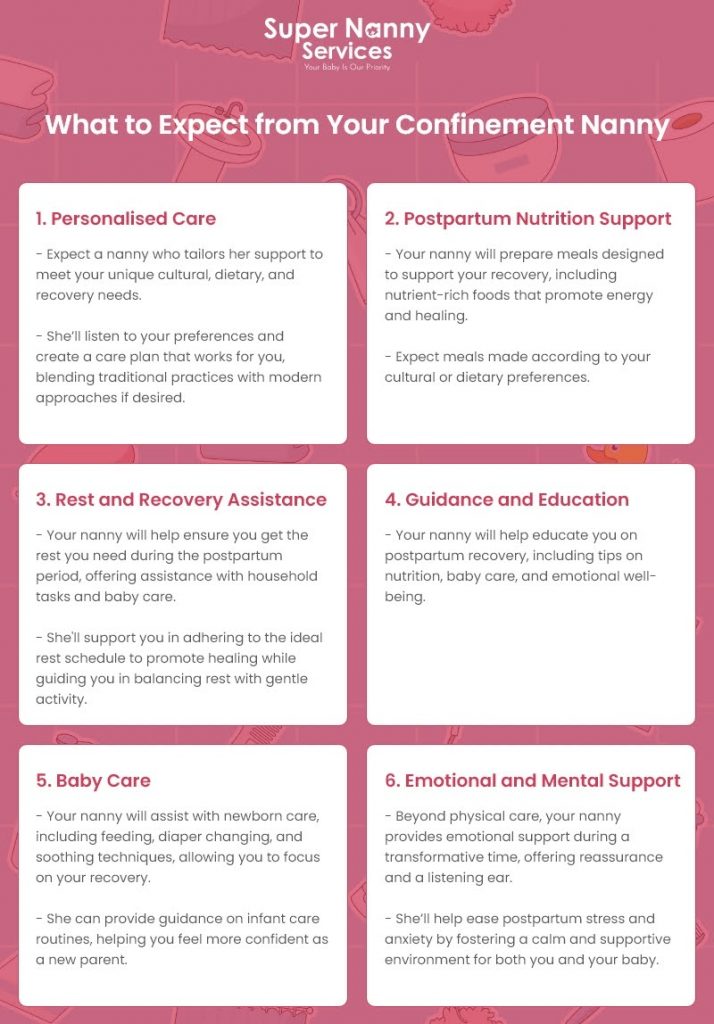
Part 3: How Confinement Agencies Can Bridge Cultural Practices
Confinement agencies in Singapore play a crucial role in blending traditional postpartum practices with modern needs. By offering a personalised approach, they ensure that new mothers receive the care they deserve while respecting their cultural traditions. In this section, we explore how these agencies cater to diverse needs, providing flexible, tailored services that align with various cultural practices.
3.1 Importance of a Personalised Approach
A personalised approach is essential for effective postpartum confinement care, especially in a multicultural setting like Singapore. Confinement agencies that acknowledge and adapt to the unique cultural needs of each family offer a more supportive and meaningful experience. Understanding individual preferences and traditions allows these agencies to build trust, create comfort, and ensure mothers receive the care that best supports their recovery.
Understanding Diverse Needs
Confinement agencies play an important role in recognising their clients’ diverse cultural backgrounds and offering services that respect and incorporate specific traditions. Whether adhering to dietary practices, following rituals or providing physical care in line with cultural beliefs, a personalised approach fosters trust and strengthens the emotional bond between the family and the confinement agency. Honouring these traditions creates a safe, supportive environment for the new mother and her family, helping them navigate this delicate and transformative time with confidence and respect.
Customised Nanny Services
The role of the confinement nanny extends beyond simply providing care; it involves working closely with the family to tailor daily routines and services to their cultural needs. Confinement nanny services can include adjusting meal plans, incorporating specific herbal treatments, and following traditional practices such as massages or body binding, all based on cultural preferences.
For families following Chinese, Malay, Indian, or Western practices, nannies offer flexibility in cooking styles, dietary restrictions, and physical activities. Some nannies may adopt a more modern approach, blending traditional rituals with contemporary needs, creating a balanced experience that supports comfort and recovery. This hybrid model ensures that mothers receive personalised care that fits their unique preferences—whether they want to adhere strictly to tradition or prefer a more flexible postpartum experience.
3.2 Role of Training and Cultural Sensitivity
Cultural sensitivity training is vital for confinement agencies that aim to provide respectful, inclusive care to clients from diverse cultural backgrounds. This training ensures that nannies are well-equipped to understand and honour different postpartum practices. Whether it’s the Chinese tradition of zuo yue zi, Malay pantang practices, Indian Ayurvedic principles, or Western postpartum recovery, cultural knowledge is vital to offering personalised support.
Trained nannies can confidently navigate cultural customs, such as dietary restrictions or body care rituals, making sure mothers feel respected and supported in their recovery. They can also guide families through unfamiliar traditions, offering reassurance and understanding. Cultural competence goes beyond knowledge—it helps build trust and rapport, which are essential for a positive postpartum experience. This ensures families feel seen and understood during such a transformative time.
Creating a Multicultural Team
Building a diverse team of nannies from diverse cultural backgrounds is essential for offering multicultural confinement care. With nannies who understand various cultural practices, agencies can provide services tailored to the specific needs of each family. For example, a nanny trained in Malay urut massage can offer traditional postnatal care for Malay clients. At the same time, another with expertise in Ayurvedic practices can guide Indian families through postnatal wellness routines.
A multicultural team not only enhances an agency’s ability to offer culturally aligned care but also builds trust and comfort for clients. Families are more likely to feel at ease when paired with a nanny who understands their cultural background. Additionally, this approach helps agencies adapt to Singapore’s diverse population, ensuring that each family’s unique needs are met with respect and understanding. This fosters stronger relationships and a more personalised, culturally sensitive experience.
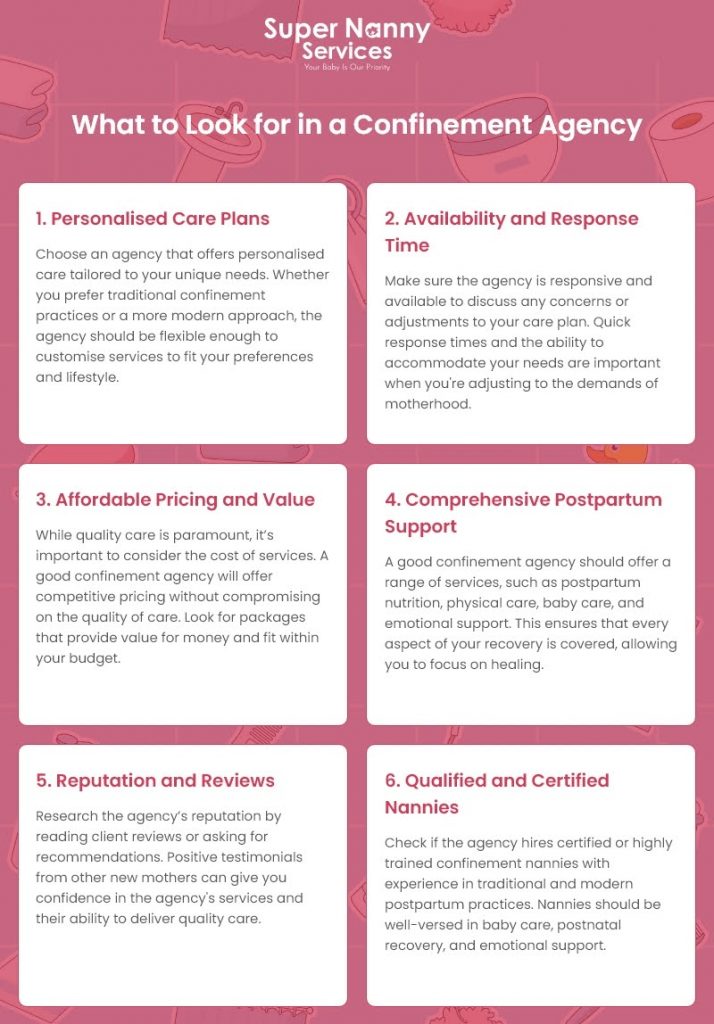
3.3 Questions You Might Have
Here are some common questions about postpartum confinement practices and how confinement nannies can support you during this special time.
1. How do confinement practices differ in terms of diet and activities?
Each culture has its own unique approach to postpartum recovery, especially when it comes to diet and physical activity. For instance, Chinese confinement traditions focus on warm, nutrient-rich foods like ginger-based soups and herbal teas to restore energy while avoiding raw or cold foods. Malay confinement also includes specific herbs, warm foods, and traditional massages for healing. Indian practices, rooted in Ayurveda, use oils and spices in both food and massage to support recovery. Understanding these traditions helps us appreciate how each culture nurtures the delicate postpartum period.
2. Can I mix practices from different cultural traditions?
Absolutely! Many families blend various postpartum confinement traditions to create a recovery plan that feels right for them. You could combine Chinese herbal soups with Ayurvedic oil massages or incorporate Western-style doula support alongside traditional practices. Our nannies are trained to help you find the perfect balance and will work with you to adapt your plan. Your postpartum journey is all about what makes you feel supported and comfortable, and we’re here to guide you in making it your own.
3. How can a confinement agency support non-traditional or modern approaches?
We understand that not everyone feels drawn to traditional confinement practices, and that’s perfectly fine. Many families today prefer a more flexible or Western approach, which might focus on a balanced diet, light exercise, and emotional support rather than strict guidelines. Our agency can tailor confinement care to fit your needs, offering nutritional guidance, gentle physical activities, and mental health check-ins. Whether you want to incorporate traditional elements or embrace a more modern routine, we’re here to provide personalised care that supports you in a way that feels right for you during your postpartum recovery.
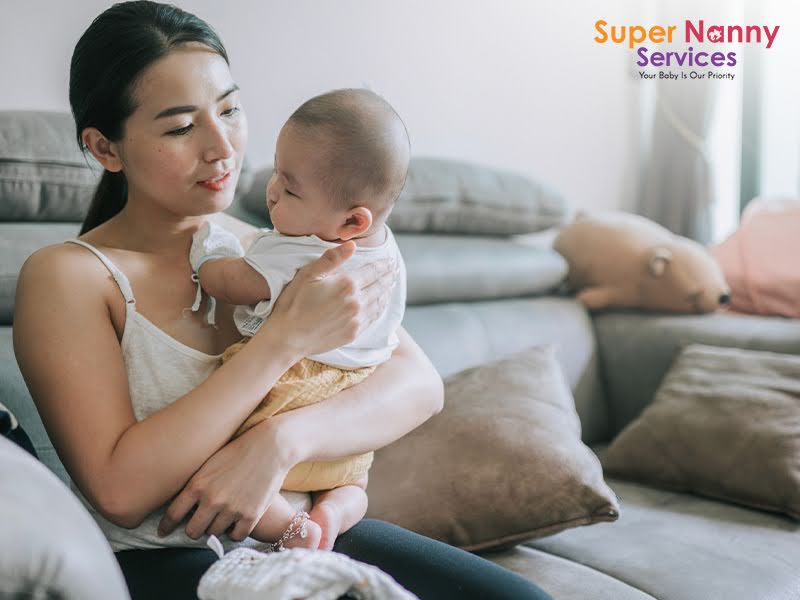
Postpartum confinement practices play a vital role in supporting new mothers, promoting recovery, and enhancing overall well-being. These practices, deeply rooted in various cultural traditions, offer essential care during the postnatal period, helping mothers heal and thrive. At Super Nanny Services, we recognise that each family’s needs are unique. Whether you prefer traditional practices, a modern approach, or a mix of both, our compassionate and experienced nannies are here to support you every step of the way.
We’re committed to offering a personalised confinement service that honours your cultural preferences, ensuring comfort and respect throughout your recovery journey. Let us support you during this special time, providing the care you and your baby deserve.
To learn more about our tailored services and how we can assist with your postpartum recovery, contact us today and discover the care that’s right for you.

